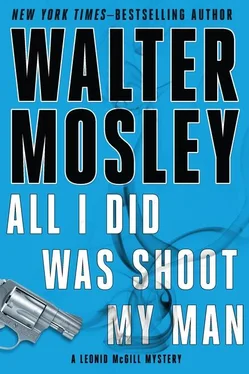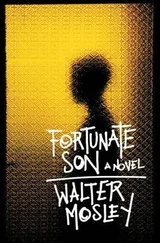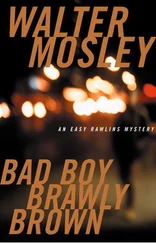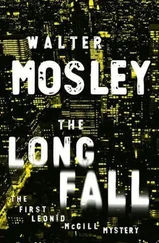I handed her the rather graphic photographs of the dead men.
She flipped through them like a grandmother pretending to be interested in another old woman’s family album.
Handing the pictures back to me, she said, “Horrible.”
“A police captain named Lethford told me that these deaths were connected to the Rutgers heist.”
“How is Clarence?”
“Mad at the world and proud of it.”
She laughed pleasantly.
“He came up here a few times, thinking that an old woman like me would have anything to do with thugs and thieves. But he always brought me chocolates.
“Why are you here, Mr. McGill?”
“Two men broke into my home and tried to murder me.”
“Tried?”
“I killed them.”
Without missing a beat she said, “I killed my stepfather, Charles Clement, when I was only eleven years old. No doubt the men after you made the same underestimation that Mr. Clement did.”
We were on equal footing. I wondered if she had a derringer somewhere on her person; the best assumption would be that she did.
“The people that sent those men after me, if they become aware of you, might send a visitor to Windsong.”
Nova’s smile was wan and unconcerned.
“I want to know who it is,” I said, “for obvious reasons.”
“Yes, I can see that.”
“Can you help me?”
“I’m not sure. I’ll have to think about it.”
“As I said — your life could be in danger too.”
“My death is already a foregone conclusion, Mr. McGill. Thank you for your concern but I have never relied upon the good graces of another to protect me.”
“So you have to think about it?”
“Yes.”
“When will you know?”
“When I know.” She stood up and began walking toward the front of the building.
I followed her to the screen door and even opened it for her.
“Thank you, Mr. McGill. I don’t need the help but I do appreciate good manners.”
The traffic was pretty good and I made Lower Manhattan somewhere between two-thirty and three.
That afternoon I told the first-line security desk at Rutgers Assurance that I was there to speak to Johann Brighton. That request altered the mode of access. I was guided to an elevator at the front of the building that took me to the twenty-seventh floor, leaving me at what can only be called a large glass cage where a young receptionist sat behind a bright blue desk.
The carpet surrounding the desk was black, and across from it, against a glass wall, was a row of seven padded yellow chairs.
Beyond the transparent walls were many doorways. For a moment I imagined that I was in a theater where the audience sat center stage and the actors performed on the periphery.
In this flight of fancy I had arrived, no doubt, at intermission.
The nameplate for the lovely café au lait receptionist read KINESHA MOTUTO. She looked up at me and smiled.
“Have a seat and someone will be with you,” she said.
“Do you know how long it will be?”
“I’m sure it will be soon,” she said, returning her gaze to the papers on her blue desk.
“What section is this?”
Kinesha looked up at me pleasantly and said, “Just have a seat, sir. Someone will be with you soon.”
I took the center chair and laced my fingers, prepared for a long wait. But less than a minute later a door behind and to the left of Kinesha swung inward and Alton Plimpton appeared. That day the slight manager wore a dark green suit and a bruised-banana tie. He stared at me a moment from behind the doubtful protection of the glass barrier. Then he rapped on the glass.
Kinesha turned, saw who it was, and touched something on her desk. An invisible panel began rising from the floor, forming a gap large enough for a man to pass through.
Alton walked up as I stood to meet him.
Before he could speak I said, “I’m here to see Johann Brighton.”
“I had your name associated with mine in the visitors’ database,” he replied.
“Funny, there’s a captain in the NYPD that’s done the same kind of thing with me.”
“What is your business here, Mr. McGill?”
“Mr. Brighton,” I answered.
“Mr. Harlow does not want you on the premises.”
“Who’s that?”
“It’s enough for you to know that he doesn’t appreciate your presence.”
“Then why did you let me up?”
“We have a security team standing by.”
“And do you think that they could grab me before I broke your neck?” I hadn’t had much sleep in more than thirty-six hours. The spark on my fuse was entering the body of the bomb.
Kinesha stood up. I wondered if she was part of the security team.
A tall man in a dark suit passed through the space in the glass wall.
“Mr. Plimpton?” the man said.
Alton turned, giving me the opportunity to scrutinize the new corporate player. This man was tall, black-haired, and fit. Either he was wearing a blue suit or I was; we couldn’t both be because our clothes were different species in the capitalist jungle.
“Mr. Brighton,” Plimpton said with a deference that no doubt tore at his nerdy self-esteem.
“What are you doing here?” the VP asked the manager-at-large.
“Mr. Harlow asked me to inform Mr. McGill that he was not to come here.”
“I don’t remember asking Mr. Harlow to take that action.”
Ah... the chain of command.
“Well, I, we didn’t think that you needed to be bothered.”
Brighton turned his attention from Alton to me.
“Johann Brighton,” he said, extending a hand.
“Leonid McGill.”
Brighton was handsome and charismatic. Mentally, I had to bear down a little not to start liking him.
“Your name has been all over my desk of late, Mr. McGill. I was happy when my secretary told me that you were here.”
“Mr. Brighton,” Alton Plimpton said.
“Come with me, Mr. McGill,” Johann Brighton said, ignoring the underling. “We’ll go up to my office to talk.”
We passed through the glass wall and entered a door that opened onto a long slender hallway. We followed that vascular path to a cylindrical room with four elevator doors placed at ninety-degree intervals. Brighton held a thick card in front of a crystal green panel and one of the doors slid open.
Inside the chamber a voice said, “Hello, Mr. Brighton, sixty-sixth floor?”
“Yes,” he said.
I was impressed.
“Mr. Plimpton doesn’t seem to like me,” I said, just making conversation.
“Alton has worked for Rutgers thirty-three years. He started in the mailroom.”
“... and,” I said, “has only recently realized that coming in at the bottom almost always precludes reaching the top.”
The VP turned his head to regard me. His eyes were green and his aspect somewhere between that of a fox and a wolf; the one creature preying on smaller animals, and the other, with his pack, used to taking down creatures much larger than himself.
Which one, he was wondering, was I?
The elevator door slid open and we were presented with a triple-wide hallway that was tiled in emerald and gold. On the walls hung large still-life oil paintings, mostly landscapes, with the occasional study.
There were no offices on this half-block journey, not until we came to the dead end. There the double walnut doors we encountered swung open automatically and we entered the antechamber to his office.
Not for the first time in my life I had made it to the top. For some reason this made me hanker for a chili dog with chopped onions under a blanket of processed American cheese.
The reception room for Brighton was large and well appointed. There was a window looking out over the Statue of Liberty. The kidney-shaped desk was clean, and the woman behind it — the woman known as Claudia Burns — looked up, attentive to her charming boss’s any need.
Читать дальше












